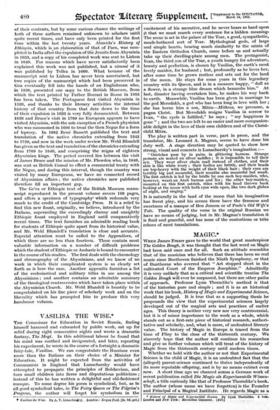VASILISA THE WISE.*
THE Commissar for Education in Soviet Russia, finding himself harassed and exhausted by public work, sat up for relief during eight consecutive nights and wrote a dramatic fantasy, The Magi. In this additional labour he found that his mind was soothed and invigorated, and later, repeating his experiment, he wrote in the course of a fortnight a dramatic fairy-tale, Vasilisa. We can congratulate the Russians even more than the Italians on their choice of a Minister for Education. It might be expected from the activities of Communists in England that Lunacharsky would have attempted to propagate the principles of Bolshevism, and turn small children into fierce and disputatious politicians ; instead of this he has written a delightful and old-fashioned masque. To some degree his poem is symbolical, but, as In all good symbolical tales, in The Fairy Queen or The Pilgrim's Progress, the author will forget his symbolism in the Vasilisa the Wiw. By A. Y. Lanark:447.. Loudon : Nepal Paul. [3s. M. =LI
excitement of his narrative, and he never bears so hard upon it that we must search every sentence• for a hidden meaning. The scene is set in the palace of the Tsar, a good, sympathetic, much-bothered sort of Tsar. Mythological gods, of large and simple hearts, bearing much similarity to the saints of the Eastern Orthodox Church, come before us and actually take up their dwelling-place among men. The protagonist, Ivan, the third son of the Tsar, a youth hungry for adventure,
beauty and perfection, is chosen by Vasilisa, the earth's most lovely maiden, for husband ; but, profoundly as he loves her, after some time he grows restless and sets out for the land of the moon. He stays for some years in this legendary country with its Queen, and is in a measure happy, " dull as a flower, in a strange blue dream which benumbs him." At
last, disaster having overtaken him, he makes his way back to earth. Meanwhile, Vasilisa has been given in marriage to
the god Merodakh, a god who has been long in love with her ; she has borne him a son, Mitra—Mithras, we presume, a
pagan Christ. But Merodakh resigns Vasilisa in sorrow to Ivan, " the cycle is fulfilled," he says ; " my happiness is gone " ; and the two are left to an easier and more companion- able delight in the love of their own children and of the Christ- child Mitre.
The play is written part in verse, part in prose, and the translator, Mr. Leonard A. Magnus, seems to have done his duty well. A stage direction may be quoted to show how strong, visual and concrete is Lunacharsky's imagination :-
"Ostriches pass by in pairs, in glittering harness. Strange persons are seated on silver saddles ; it is impossible to tell their sex. They wear silver chain mail instead of clothes, and their skin is like white ivory ; their bodies are brittle, anetheir heads are top-heavy with the weight of their black hair ; their eyes are terribly big and mournful, their mouths also mournful but small. The first ostrich is led by the bridle by one such boy-maiden, who, however, wears an Arab burnus and fez ; the other boy-maiden, mounted on this first ostrich, rides with his head thrown back looking at the moon with both eyes wide open, like two dark globes of night, and singing."
It is naturally in the land of the moon that his imagination has freest play, and his scenes there have the firmness and
sweetness of a masque of Ben Jonson or of Peele's Old Wife's Tale. The quality of the verse in the original Russian we have no means of judging, but in Mr. Magnus's translation it
is fluid and graceful, and has none of the contortions or trite echoes of most translations.


































































 Previous page
Previous page